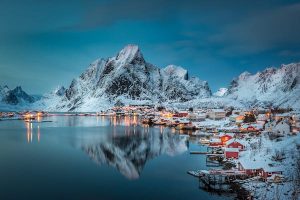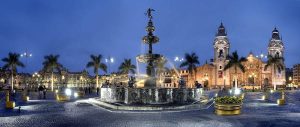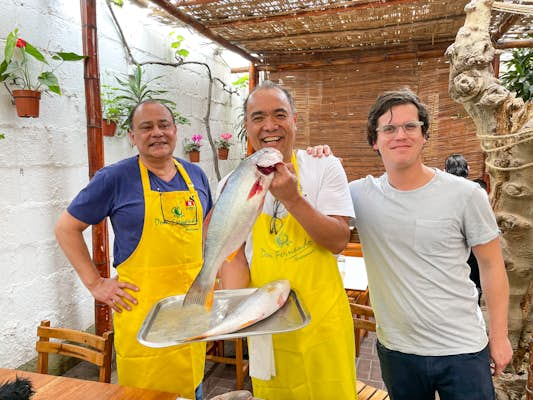
Lima, Peru is a gastronomical delight centuries in the making.
Best known for its cevicherías and Pisco cocktails, Lima is the place for fresh seafood, exploring Peruvian cuisine and so much more.
Chef Ricardo Martins shows you the culinary wonders of the city.

I’m the chef and owner of Siete Restaurante in the Barranco district of Lima, Peru. We serve contemporary Peruvian cuisine made from local produce, and with a fun, global perspective on food. (If you stop by, try our short ribs, scallops or cheese tart.)
Before I became a chef, I studied anthropology and music. I love hunting for vintage Peruvian albums at record stores – the gems you can’t find on Spotify but you might hear if you visit my restaurant.

Why you should visit Lima, Peru
Lima has a beautiful and diverse history, geography and culture. These things have deeply influenced Peru’s food scene, and its capital has arguably grown into the culinary capital of Latin America.
How to eat your way across Lima
When I was in university, I studied anthropology and wrote my thesis on how food gave Peruvians a national identity. The ingredients, spices and cooking methods of Indigenous, Spanish, Japanese, African and Chinese cultures have all influenced my country’s cuisine.
To get a taste of all of these flavors, here are my suggestions for what to see – and eat.
Discover culinary influences from around the world
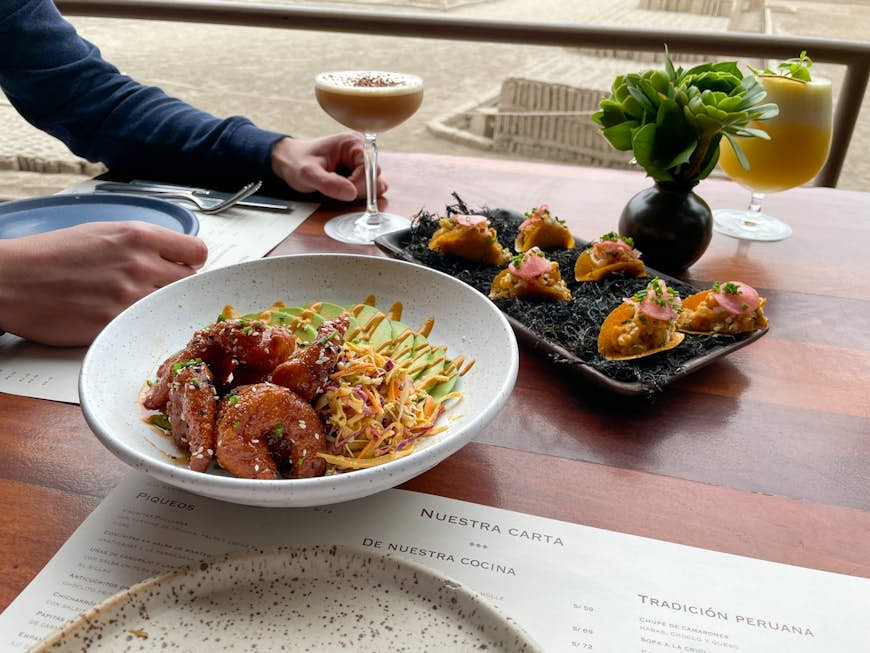 La Huaca Pucllana has a tasty menu to sample after your museum visit © Jack Pearce/Lonely Planet
La Huaca Pucllana has a tasty menu to sample after your museum visit © Jack Pearce/Lonely Planet
Start with a walk through the center city to get a feel for the diversity of cultures that have influenced Lima. Plaza San Martín is the true center of my city, and I love it because I think you can feel the history of Lima in the architecture here.
In the middle of this modern, bustling city, you’ll be surprised to find La Huaca Pucllana, an ancient archeological site built before the Incas. Overlooking the site is an elegant restaurant (also called Huaca Pucllana) that features contemporary Peruvian cuisine.
Grab some street food to taste Indigenous influences. Near Plaza San Martín, I bought corn on the cob with cheese (what we call choclo con queso) seasoned with chili and huacatay (a black mint sauce).
Also in the historic center of Lima, Barrio Chino is one of South America’s largest Chinatowns. The first Chinese immigrants arrived in Lima 200 years ago, and their spices and cooking techniques have shaped Peruvian cuisine in important ways. In fact, Lima is the birthplace of chifa, a fusion of Cantonese and Peruvian cuisine. On Calle Capón, there are small restaurants like San Joy Lao or Wa Lok where you can try this unique culinary tradition.
Taste the market’s bounty
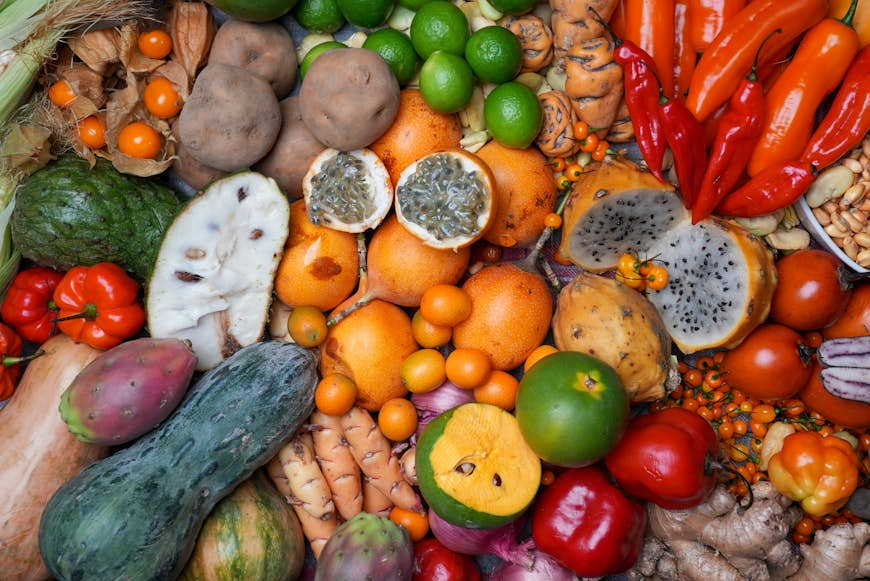 Fruits, vegetables, meats, and seafood of all variety can be found at Lima’s markets © Jack Pearce/Lonely Planet
Fruits, vegetables, meats, and seafood of all variety can be found at Lima’s markets © Jack Pearce/Lonely Planet
Along with diverse cultures, Lima’s geography also has greatly influenced available culinary ingredients. The country has a variety of microclimates and landscapes, from the coast to mountains to jungle. Lima itself is a city that sits on the Pacific Ocean, with the Andes and Amazon rainforest beyond.
That all contributes to a diversity of ingredients to choose from. You can get an idea of the variety of fresh produce available by heading to Mercado de Surquillo, where you can see everything available to chefs.
From the mountains, you’ll find colorful native potatoes. Cocona is a very special and acidic fruit that comes from the jungle. Peru’s waters are also rich and diverse: you’ll find items like the super flavorful bull crab which can be made into a chupe (a stew similar to a bisque). You’ll also find ingredients like giant squid, mussels, razor clams, normal clams, baby clams and shrimp.
Don’t leave the market without trying tiger’s milk. It’s really special. You likely know the classic dish ceviche: the dish’s juice, what makes it really sing, is called leche de tigre. What you find in the market is like a mini version of a ceviche – only with a deep-fried giant squid.
This is just one of many examples of the wonderful things that come from the small shops in the market.
Hit Lima’s world-famous restaurant scene
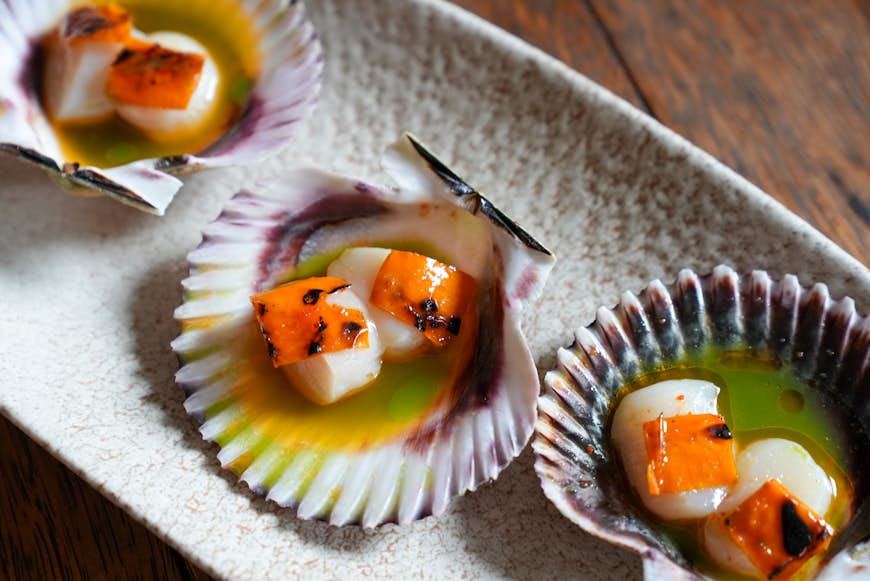 Scallops at Rafael are a must taste © Jack Pearce/Lonely Planet
Scallops at Rafael are a must taste © Jack Pearce/Lonely Planet
When you think of Peruvian food, the most iconic dish will always be ceviche, raw seafood marinated with lime and spices. To me, the magic comes from seasoning with a chili from the north called aji mochero.
Don Fernando restaurant sums up what I love about ceviche: freshness and tradition. For me, this is among the best ceviche in the world.
For hundreds of years, Peru has enjoyed a mixture of Spanish and Indigenous dishes that we all call comida criolla. My favorite place to eat this food is Isolina. Need some recommendations of what to try? My grandpa’s favorite dish, papa rellena, is a deep-fried potato stuffed with a meat stew. Lomo saltado is stir-fried sirloin steak influenced by flavors from Asia. When it’s prepared right, you’ll notice the strength of its smokiness.
One country that’s had an enormous influence on Peruvian food is Japan. Ever since Japanese immigrants arrived in Peru over 100 years ago, they have created a unique kind of fusion called nikkei. Often ranked among the best restaurants in the world, Maido is the perfect place to experience nikkei cuisine. On the incredible menu are things like cod from Peru and Japanese-style tempura, and Peru’s potatoes prepared with Japan’s ramen. It’s outstanding.
My favorite restaurant in Lima is Rafael, which specializes in what we call contemporary Peruvian cuisine. It has been around for more than 20 years, and it’s always evolving. Among my favorite people are chef-founder Rafael Osterling and executive chef Rodrigo Alzamora, and their restaurant reflects the fun of cooking. Rodrigo is continuing the restaurant’s legacy in extraordinary ways. The preparations here are eclectic and speak to Peruvian flavors, setting them in a refined, worldwide perspective. These flavors play along with Italian cuisine, Indian cuisine, Mediterranean cuisine…and that’s a beautiful thing.
Want to head to Lima but wish there was someone to plan this out for you? Let Lonely Planet’s sister company Elsewhere take away some of the stress by planning this trip by connecting you with the best local expert to craft your dream trip. In Peru, they’ll connect you with Ana Sofia, and her all-female team who can help with everything from bespoke trips to hardcore adventure. Get ready for a wildly unique itinerary that could only come from Elsewhere’s network of destination experts.

